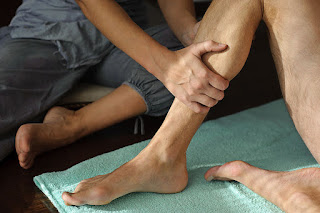Restless leg syndrome, one more thing keeping you awake!
Restless Leg Syndrome
If you have ever suffered from an uncomfortable and uneasy feeling in your legs at night, you have probably experienced restless leg syndrome. Driven by an urge to move, restless leg syndrome often disrupts your sleep, leaving you irritable, tired and depressed.
What is Restless Leg Syndrome?
Restless leg syndrome is a condition that leaves you with an uncomfortable and restless feeling in your legs. Although symptoms can occur at anytime, they are often worse or intensified at night or when you are relaxing or trying to sleep.
There are two forms of restless leg syndrome, simply referred to as primary and secondary. Primary restless leg syndrome has no known cause and symptoms develop gradually, before the age of 45. There is often a family history of restless leg syndrome and it can be misdiagnosed as growing pains in children. Symptoms often worsen as time goes on.
Secondary restless leg syndrome occurs after the age of 45, with symptoms the come on suddenly, do not worsen and is often linked to lifestyle and medication and/or medical conditions.
Causes of restless leg syndrome that can affect both forms of the condition include:
- Low iron levels
- Arthritis
- Pregnancy
- Kidney disease
- Diabetes
- Menopause
Medications such as anti-depressants, anti-psychotics, anti-histamine, and calcium channel blockers
Symptoms of restless leg syndrome can range from a minor annoyance to a major disruption. The main symptom is a restless, uneasy feeling in your legs that can be described as:
- An itching sensation the can't be scratched
- A buzzing sensation in your muscles
- A crawling feeling like bugs or ants are crawling under your skin
- A tickle that won't stop
- An intense urge to move or exercise
Because restless leg syndrome is worse when you are trying to relax or sleep, you may experience difficulties either falling asleep or staying asleep. This can lead to tiredness, low energy levels, irritability and even depression.
iACHE.com is a platform that attempts to bridge a huge gap in the care of people suffering from chronic pain or addiction disorder. Visit our site for more details about Low Back Pain Medication.
Treating Restless Leg Syndrome
Restless leg syndrome is a difficult condition to treat because the exact cause of the restless sensation is unknown. Exercise or movement of the legs often helps to relieve symptoms, as does massage and stretching but these are often temporary measures. Sufferers of restless leg syndrome are generally advised to exercise regularly to help with circulation (but avoid excessive exercise as this can make symptoms worse) and to make lifestyle changes such as reducing caffeine, alcohol and tobacco intake and reducing stress.
Preventing Restless Leg Syndrome
Although restless leg syndrome is difficult to treat, there are a number of things you can do to help prevent or reduce the condition. Options for preventing restless leg syndrome include:
- Increase your iron intake - low iron levels lower the transportation of oxygen in your blood, meaning your muscles are not receiving the oxygen and nutrients they need to perform properly. Increasing your iron intake, either by eating more iron rich foods such as red meat, fish, spinach etc or by taking an iron supplement may reduce the restlessness in your legs at night.
- Exercise regularly - regular exercise boosts circulation and burns excess energy, both of which can help relieve the feeling of restlessness.
- Reduce stress and anxiety - restless leg syndrome can often be made worse by worrying about the cause. Worrying about why it is happening and when it will stop means your focus is on the symptoms and it can feel worse than it is. Try distracting yourself and practicing some anxiety relief so your focus is anywhere but on your restless legs.
- Check your medications - certain medications can cause restless leg syndrome in some people so it is worth checking with your health care professional to see if that is the cause.
- Loosen your sheets - if you like to sleep with your sheets tightly tucked into the end of your bed, this could be contributing to your symptoms. Tight sheets place your foot in a pointed position that may disrupt or effect the nerves in your legs. Loosening your sheets will relieve some of the pressure on your feet and legs.
- Avoid stimulants - avoiding stimulants such as caffeine, alcohol, tobacco or drugs, especially before bed, not only helps to reduce restlessness in your legs but allows you to unwind and get a better night's sleep.
Restless leg syndrome can disrupt your sleep and have a flow-on effect on the rest of your life. While symptoms can range from a minor annoyance to major frustration at not being able to sleep or get comfortable, there are steps you can take to try and reduce your incidence of restless leg syndrome. If you are suffering from restless leg syndrome, try some of the suggestions above to relieve your symptoms.




Hello everyone, i'm Linda Harry from United State i was diagnosed with Parkinson Disease for over 6 years which made me loose my job and my relationship with my Fiance after he discovered that i was having Parkinson, he departed from me, and i tried all my best to make him stays, but he neglected me until a friend of mine from UK told me Great healer, who will restore my life back with his powerful healing herbal medicine. then he sent me his email address to contact him- drimolaherbalmademedicine@gmail.com. and i quickly contacted him, and he said my condition can be solved, that he will treat the disease immediately only if i can accept trust on him and accept his terms and condition, i Agreed because i was so much in need of help by all means, so i did all he instructed me to do. And surprisingly after two weeks, He sent me a text, that i should hurry up to the hospital for a checkup, which i truly did, i confirm from my doctor that i am now ( PARKINSON NEGATIVE) my eyes filled with tears and joy, crying heavily because truly the disease deprived me of many things from my life, This is a Miracle, dr imoloa also uses his powerful herbal medicine to cure the following diseases: lupus disease, mouth ulcer, mouth cancer, body pain, fever, hepatitis A.B.C., syphilis, diarrhea, HIV/AIDS, Huntington's Disease, back acne, Chronic renal failure, addison disease, Chronic Pain, Crohn's Disease, Cystic Fibrosis, Fibromyalgia, Inflammatory Bowel Disease, fungal nail disease, Lyme Disease, Celia disease, Lymphoma, Major Depression, Malignant Melanoma, Mania, Melorheostosis, Meniere's Disease, Mucopolysaccharidosis , Multiple Sclerosis, Muscular Dystrophy, Rheumatoid Arthritis, Alzheimer's Disease, parkison disease, vaginal cancer, epilepsy, Anxiety Disorders, Autoimmune Disease, Back Pain, Back Sprain, Bipolar Disorder, Brain Tumour, Malignant, Bruxism, Bulimia, Cervical Disk Disease, cardiovascular disease, Neoplasms, chronic respiratory disease, mental and behavioural disorder, Cystic Fibrosis, Hypertension, Diabetes, asthma, Inflammatory autoimmune-mediated arthritis. chronic kidney disease, inflammatory joint disease, impotence, feta alcohol spectrum, Dysthymic Disorder, Eczema, tuberculosis, Chronic Fatigue Syndrome, constipation, inflammatory bowel disease, bone cancer, lung cancer. contact him on email- drimolaherbalmademedicine@gmail.com. and also on whatssap- +2347081986098
ReplyDelete